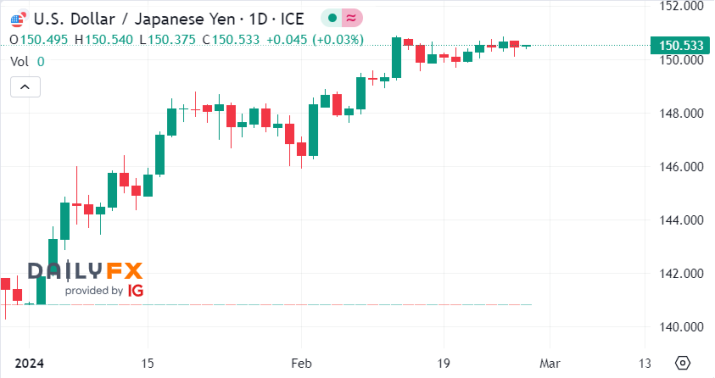With global risk sentiment growing and the US currency under pressure to test its 200-day moving average amid increased risk appetite, last week’s spike in US stocks and Nvidia’s performance drove the S&P 500 to all-time highs. But a slowdown in economic activity, as seen by Monday’s lower trade volumes because of scant data, points the attention to Japan’s next inflation numbers, which are expected shortly before Monday midnight.

This publication becomes significant in light of the focus on salaries and prices, particularly in light of the ongoing speculation about a policy move by the Bank of Japan. It looks that inflation is slowing down, which could affect the value of the Japanese yen, notwithstanding recent remarks made by the Bank of Japan. Interest is centered in the US on the second estimate of Q4 statistics and the Reserve Bank of New Zealand’s statement on monetary policy.
Examination of Germany’s inflation and unemployment figures is warranted across Europe following the Bundesbank’s warning of an impending recession. Greater significance will be placed on the upcoming Federal Reserve publication of Personal Consumption Expenditures (PCE) statistics, which is anticipated to show 0.4% monthly price increases but only slight annual decreases. The British pound finds stability near its 200-day moving average, despite the UK economy growing more slowly than expected.
Gold continues to rise in the commodities market against obstacles that could prevent further gains against the backdrop of a declining US dollar. On the other hand, oil prices experience a minor decline following consolidation, which is partially caused by weak Asian and Chinese markets that suggest muted prospects for global growth.
Everyone is focusing on the S&P 500’s continuous rise as the US equity market is predicted to open flat. With expectations of a flat US equity market start, all eyes are on the S&P 500’s continued ascent.
Japanese Inflation Figures Awaited Amid Market Caution
Notable drops in the MSCI Asia ex-Japan index and Chinese stocks have the Asian market ready for the coming week, wary following last week’s tech-driven buying frenzy. the Bank of Japan’s 2% objective for the first time in almost two years, despite a light economic calendar, is anticipated to be exceeded by Japan’s consumer inflation report for January. A slowdown in annual core inflation to 1.8% from 2.3% is predicted, but headline inflation will likely ease from December’s 2.6% level.
In light of recent indications of an unexpected year-end recession, the Bank of Japan’s normalization plans are complicated by this upcoming data. The current problems could be made worse by a reading that is below consensus, which would raise questions about the viability of changing policy. A BOJ interest rate hike is expected next month, but choices about it are hampered by the current state of the economy, which is marked by weak inflation and a recessionary environment.
Bearish mood and sizeable short positions held by hedge funds and other players have contributed to the yen’s ongoing pressure even if the dollar is getting close to all-time highs against the Japanese yen. Less worries about Japanese intervention haven’t stopped the elevated speculative positioning from being a concern.
Market Outlook
Amidst the cautious stance in Asian markets and the impending release of crucial inflation data from Japan, market participants brace for potential volatility ahead. The outcome of the inflation report could significantly impact investor sentiment, particularly regarding the Bank of Japan’s policy direction. Any deviation from expectations may prompt reassessments of market positions and strategies, potentially leading to increased volatility in currency markets, especially concerning the USD/JPY pair.
A keen eye and flexible response to market conditions will be essential for traders as they negotiate the unpredictability of Japan’s economic situation and its consequences for monetary policy. Furthermore, changes in geopolitical contexts and other major economies, like the US and Europe, could have an impact on asset price and market mood.
In general, despite the current uncertainty surrounding the market, traders who are skilled at analyzing and reacting to changing economic data and geopolitical events have a wealth of possibilities to make well-informed decisions.